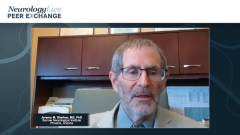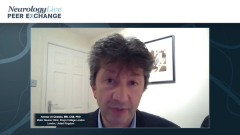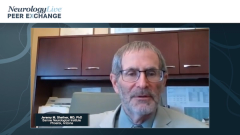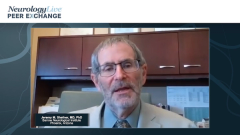
Multidisciplinary Approach to Palliative Care in ALS
Expert neurologists discuss the importance of a multidisciplinary approach to the management of symptoms for palliative care in amyotrophic lateral sclerosis (ALS).
Episodes in this series

Richard S. Bedlack, MD, PhD, MS: Let’s talk a bit about symptom management in people with ALS [amyotrophic lateral sclerosis] now. All of us have what are called multidisciplinary clinics, where patients come, or by video, and are seen not only by a neurologist but also by a respiratory therapist, speech therapist, nutritionist, a physical therapist, an occupational therapist, a social worker, and sometimes some of the nurses.
Jinsy, these are incredibly resource-intensive clinics. They are difficult to put together with many hours for each patient of being evaluated. Why is this important to do?
Jinsy A. Andrews, MD, MSc: I alluded to this a bit before: the multidisciplinary management of ALS is essential in trying to make sure we preserve quality of life, and it even impacts survival. Even in the era of telemedicine now, in the era of COVID-19, we at Columbia University Department of Neurology still do telemedicine visits as a multidisciplinary team. There are multiple providers and virtual rooms created where people with ALS and their caregivers can be sitting in, and we Zoom or video in and out of the visit. All the health care specialists will rotate through. The impact of that type of care and that type of attention to symptoms is underestimated.
Often, a person with ALS will come and ask me, “What kinds of medications or interventions will help me live longer?” It is often the simplest of things that I empathize, and that can make a massive difference in the way they live every day. That includes taking care of their psychological health and their emotional health. It is critical, and it is amazing: their perception of the disease is not related to their disability. Some people who have all limbs that are weak will be active and fundraising, and be very positive. Someone with just foot drop may be devastated by the loss of that function, so it is very individual. Taking care of psychological health is important.
Trying to talk about how to manage weight and keeping the weight stable is critical. We know that is important based on clinical trial studies. Also, trying to proactively intervene on respiratory symptoms. Historically, neurologists would often focus on the function but not look at early signs or early symptoms of respiratory insufficiency, so we should be intervening on those as early as possible. And then trying to be proactive about each of the symptoms that should come up. We should be trying to help with devices and durable medical equipment to help them be as efficient as possible at home to do the activities of daily living and prevent falls. All of those by themselves do not seem so special, but all of it together makes a big difference.
Richard S. Bedlack, MD, PhD, MS: Ammar, it certainly sounds like this approach makes sense. The disease is affecting so many different things so quickly in a lot of patients such that a team approach makes sense. Are there any data that people who come to these kinds of clinics do better in any medical way compared to people who do not?
Ammar Al-Chalabi, MB, ChB, PhD: Yes. There have been a few studies that have looked at that, and all of them show that people who come to a multidisciplinary clinic do better. Even measuring just survival, the effect is about the same as the effect of riluzole. The reasons for that are unclear, but they are probably related to the fact that, when you have a multidisciplinary team, you can suggest an intervention at the correct time. If you do not have a multidisciplinary team, the intervention that will improve the quality of life and probably quantity of life, is not necessarily suggested, or it may be delayed before it is implemented. So it is probably that type of expertise that will help. The quality of life is important as well as the quantity of life, and multidisciplinary teams have expertise that is not available elsewhere. For example, voice banking specialists are difficult to find outside a multidisciplinary team for ALS where they are needed, so it is important, and there is a lot of research suggesting that it is a good thing to do.
Richard S. Bedlack, MD, PhD, MS: Thank you. Jeremy, among the many things that happen in the clinic, we screen for and manage lots of symptoms. Some people refer to this as palliative care. Do you have a palliative care expert in your clinic at Barrow Neurological Institute?
Jeremy M. Shefner, MD, PhD: The word palliation has an unfortunate association in the United States. Palliative care and hospice care are often talked about in the same breath, but as you just mentioned in the way you framed the question, palliation means making something less severe. That is everything we do in the multidisciplinary clinic. If you take somebody who is having trouble walking and give them a foot brace, that is palliation. If you take somebody who is having respiratory difficulty, and you introduce noninvasive ventilation or a variety of things that help respiration, that is palliation. Palliation is most of medicine, so that is intrinsic to the whole purpose of taking care of patients with diseases you cannot cure.
On the extreme end, when you talk about palliative care and hospice together, then you are actively making decisions like, “I will do this because it will help somebody’s quality of life. But I will not do this even though it may extend their life because it will change their quality of life.” For me, the time for those discussions is really late. In many ways, the ability of a patient to think of themselves as being actively treated and trying to fight their disease is incredibly important to their quality of life. Unless I am forced by insurance regulations, or unless the patient tells me that they are not interested in therapies that might prolong their life or slow the course of the disease, I try to continue those until somebody tells me to stop.
At the very end, we have a specific hospice group that is associated with our clinic, and they deal with the kind of palliation that is often what many people think about in terms of pain control, anxiety control, and control of air hunger. It is a much broader question, and we are doing palliation from the first time we see the patient.
Richard S. Bedlack, MD, PhD, MS: I completely agree. We as neurologists all screen for modifiable symptoms that can be present the first time we see patients and all the way through the disease, not just at the end. Jeremy, as the person in your clinic who does that, what are some of the more common symptoms that you identify in your patients that are taking away their quality of life, and how do you manage those?
Jeremy M. Shefner, MD, PhD: I ran through some of them briefly. The symptoms on the bulbar side include difficulty with speech and difficulty with swallowing. In my experience, speech is not terribly well treated with speech therapy. Most of the conversations regarding speech revolve around alternatives to speech when speech is not available. We have a great speech therapist whose job it is to match the right kind of device or implement to the right person.
With respect to swallowing, we need to go through the kinds of things that are more difficult and less difficult and encourage people to change their diets as necessary. We should bring up the idea of a gastrostomy tube [G-Tube] and nonoral feedings relatively early because this is something that is quite a barrier in patients‘ minds. They think of this as sort of a near death event, but in fact, many patients’ quality of life is incredibly enhanced when they are no longer working like crazy to get enough calories and can either eat for pleasure or just get their nutrition from a G-tube. That is a critical thing.
In terms of medically treatable symptoms…some of the things we just talked about, speech and swallowing, are actually medically tractable. The combination of dextromethorphan and quinidine has been shown to have a clear improvement on speech and swallowing activities, at least in some patients, so I use that.
Many patients have difficulty handling secretions, and they drool like crazy. Anticholinergics are a good first step, but botulinum toxin can often be effective. For some people, their spasticity is incredibly useful because it helps them maintain an erect posture for transferring and even for walking, so if you reduce that, it makes them more symptomatic. Many patients have stiffness and spasms that can be treated either with an antispasticity drug, such as baclofen, or more recently, we use a drug called mexiletine, which is a drug that was not introduced for ALS, but it has been shown in a couple of studies to have a benefit on cramps.
Jinsy mentioned emotional health a bunch of times. That is also incredibly critical. Finding the appropriate resources for counselling can be quite difficult, but convincing people that it is in their interest to take an antidepressant is something that we can do in the clinic. I certainly try to do that as much as I can. I am sure that I am missing many others, but I can stop and let the others speak up.
Richard S. Bedlack, MD, PhD, MS: That is a great list. Ammar, anything to add?
Ammar Al-Chalabi, MB, ChB, PhD: Yes. It might be a cultural difference, but we at Motor Neuron Clinic, King’s College London use palliative care right at the first visit. We have palliative care integrated in the clinic. I completely agree with everything that you and Jeremy have said about the symptom control aspect of the neurologist. But the palliative care specialist in our multidisciplinary team is there not just because of their expertise in control of some symptoms, which is greater than mine, but also because they have a holistic approach and take in the whole family and the spiritual aspect of the patient that I do not bother with as a neurologist because I am not trained in it. I do not even see it; I cannot understand it. They are good at understanding the impact on the patient’s life in a way that I cannot. That is why we involve them early on. Otherwise, for every other aspect, Jeremy has gone through an exhaustive, comprehensive list there. It is the same.
Jinsy A. Andrews, MD, MSc: I would have to agree. Palliative care in the United States is a tough thing to access. We do not have it readily available, so I do not have palliative care in the clinic at Columbia University Department of Neurology, but I have palliative care incorporated into the veterans’ clinic, which is a different payer system. The other thing that Jeremy highlighted was that palliative care is often tied with hospice care. Palliative care is very different, and it should be initiated as early as possible, especially in ALS.
Richard S. Bedlack, MD, PhD, MS: Thank you for watching this NeurologyLive® Peer Exchange. If you enjoyed the content, please subscribe to our e-newsletters to receive upcoming Peer Exchanges and other great content right in your inbox.
Transcript Edited for Clarity
Newsletter
Keep your finger on the pulse of neurology—subscribe to NeurologyLive for expert interviews, new data, and breakthrough treatment updates.


















